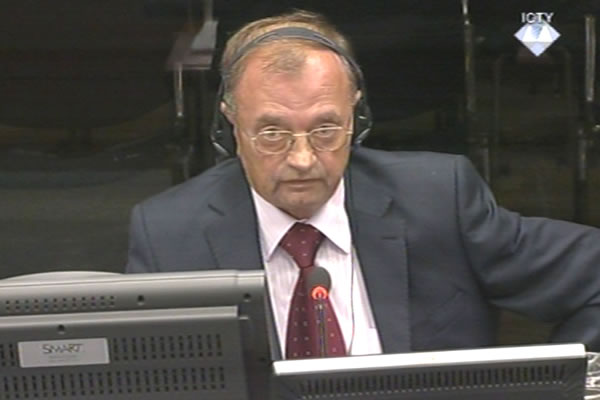Home
KARADZIC’S DIRECTIVE 7 WAS ‘ILLEGAL’, MLADIC’S ‘LEGAL’
In the cross-examination, General Manojlo Milovanovic tried as much as he could to corroborate the defense case of his former superior in the VRS Main Staff, Ratko Mladic
 Manojlo Milovanovic, witness at the Ratko Mladic trial
Manojlo Milovanovic, witness at the Ratko Mladic trial As Ratko Mladic’s defense lawyer cross-examined General Milovanovic, he tried hard to distinguish as much as possible the two versions of the notorious Directive 7. Karadzic’s ‘illegal’ directive directed the troops to create ‘by planned and well-thought-out combat operations […] an unbearable situation of total insecurity, with no hope of further survival or life for the inhabitants of Srebrenica and Zepa’. Milovanovic claims that Mladic’s directive, which does not contain the contentious sentence, was ‘legal’.
Mladic’s defense counsel Branko Lukic told the witness that General Radivoje Miletic drafted the first version of Directive 7 on Karadzic’s instructions. Milovanovic immediately agreed with the suggestion. This didn’t go unnoticed by Judge Orie, who asked the witness why he claimed that Directive 7 was written on Karadzic’s instructions. Milovanovic replied that he heard it from general Miletic’s defense lawyer. In 2007, Milovanovic testified at Miletic’s trial. The judge concluded that the witness was supposed to say ‘I don’t know’ in response to the defense counsel’s question.
Defense counsel Lukic put it to Milovanovic that Mladic in his version of the directive never referred to Karadzic’s document. Once again Milovanovic confirmed it and once again, both the judges and the prosecutor noticed that Mladic did in fact invoke Karadzic’s directive several times. Answering German judge Fluege, Milovanovic eventually had to agree that Mladic’s Directive 7/1 ‘was indeed linked with Karadzic’s’.
In the cross-examination, Milovanovic tried as much as possible to corroborate the defense case of his former superior in the VRS Main Staff. Milovanovic said that UNPROFOR and NATO sided with the BH Army. After the agreement on Srebrenica and Zepa was reached, the Security Council ‘unilaterally’ proclaimed Tuzla, Sarajevo, Gorazde and Bihac ‘safe havens’.
In Milovanovic’s words, Muslims were offered several times to demilitarize Sarajevo. Karadzic proposed to divide Sarajevo and to proclaim it ‘an open, undefended city’, Milovanovic said. Not only did the Muslims reject it, they would ‘provoke’ the Serb side by firing shells from portable mortars positioned at a crossroads somewhere and then would vanish. Serbs would respond and thus it ‘appeared’ that they were targeting civilians randomly and without control.
Milovanovic said that all aspects of life in Srebrenica were ‘militarized’. Naser Oric was ‘the big boss’: he wielded absolute power, and he was part of the military. In Milovanovic’s view, the Serb side even allowed ‘surplus’ humanitarian aid supplies to enter Srebrenica. According to Milovanovic, General Morillon told him there were 64,000 inhabitants in Srebrenica in March 1993. UNHCR provided food, clothes and other help for that number of refugees although their number, according to VRS information, was between 40,000 and 45,000.
Manojlo Milovanovic will continue his testimony tomorrow.
Linked Reports
- Case : Mladic
- 2013-09-18 MILOVANOVIC: DIRECTIVE 7 WAS ILLEGAL
- 2013-09-17 MILOVANOVIC AND MLADIC: TWO BODIES, ONE SOUL
- 2013-09-16 ‘CARPET-BAGGERS’ WERE A LEGITIMATE MILITARY TARGET
- 2013-09-20 RATKO HAD HEART OF DOVE
- 2013-09-20 AIR BOMBS WERE WORSE THAN UNRELIABLE
- 2013-09-23 FORENSIC EVIDENCE OF SREBRENICA CRIMES
